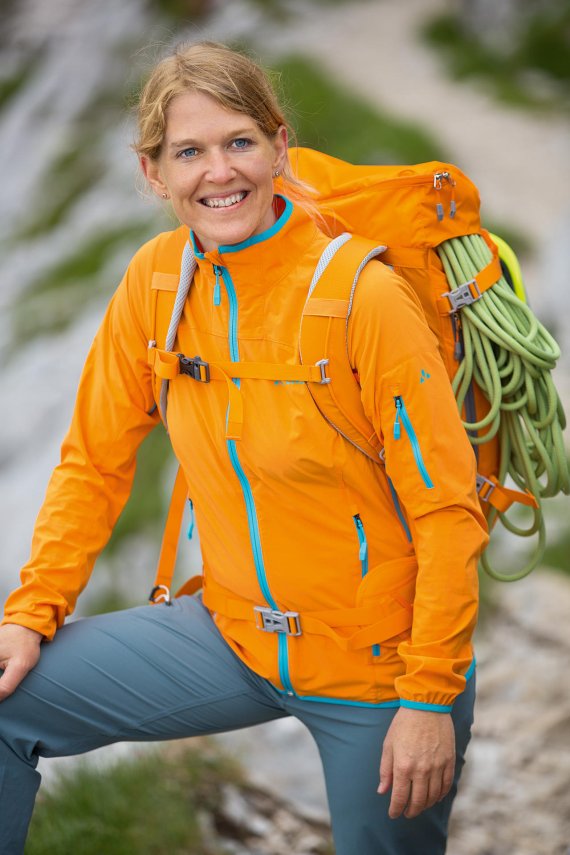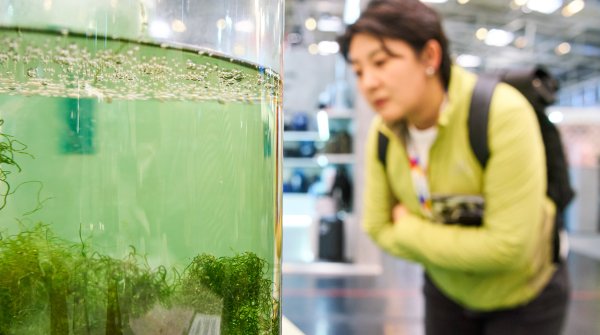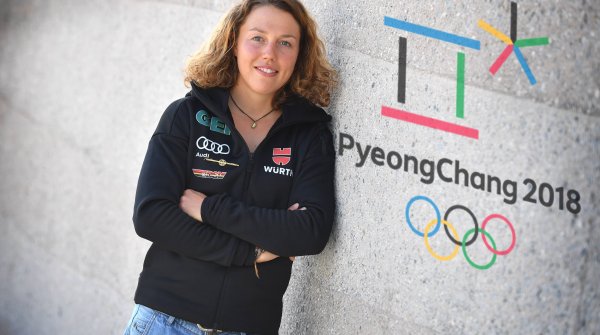
Mrs von Dewitz, it is often difficult to replace functional materials for outdoor clothing with environmentally friendly alternatives. How does Vaude solve this fundamental problem?
There are two sides to developing sustainable products: On the one hand, it is costly and takes a great deal of effort. Materials are expensive or don't even exist, which sometimes really stretches us to our limits. On the other hand, sustainability drives innovation. It is particularly exciting researching and finding solutions in areas that are currently unknown.
Is Vaude the most sustainable outdoor equipment manufacturer?
You have set yourself the target of becoming Europe's most sustainable outdoor equipment manufacturer by this year. How is that going?
From our point of view, very well indeed. In some surveys, we come out on top. This means that instead of having to say that we are the most sustainable ourselves, other people do it for us. Of course this is a comfortable position to be in.
How can sustainability even be measured?
By setting yourself goals and checking to see if you have achieved them. For example, we wanted 80 per cent of our collection to be certified as Green Shape (an eco seal introduced by Vaude, editors), to receive a Leader Status from the Fair Wear Foundation, or to set up a climate neutral site.
Is it possible to compare sustainability between companies?
We use the international sustainability standard GRI to report on our financial, social and ecological activities. Included in the reports are both our successes and of course also our "works in progress." Nevertheless, making an external comparison with others is not easy, for no other company has as transparent a communication policy as we do. That's why we regularly participate in tenders, which allow experts to do the comparing. For example, we have been nominated for the National German Sustainability Award for most sustainable German brand.
Why do you, personally, feel that Vaude is the most sustainable outdoor brand?
First of all, I must express my respect for our outdoor sector. In terms of sustainability within the textiles industry, the outdoor sector is the most advanced. This was partly because it was very much in the public eye. Many of our competitors are involved in various sustainable projects and areas. Vaude stands out because we are sustainable in the breadth and depth of what we do, throughout corporate activity – from environmentally managing our suppliers to green materials, to recycling to climate neutrality and transparent communication. I haven't encountered such an attitude anywhere else.
Do customers pay more for sustainability?
Being eco is all very well, but are customers prepared to pay more for the guarantee of sustainability?
Here is an example: We used to have bags made of PVC, which is an extremely robust and durable material, however which is also a health hazard and does not naturally decompose. The PVC-free alternative that we developed and intoduced after two years of research is more expensive by 100 per cent. Of course, we cannot raise the price of the product by 100 per cent, but we still switched to PVC-free bags. Other materials are not as expensive. By rule of thumb, sustainable materials are, on average – including all certifications – ten to 15 per cent more expensive.
How much of the increased production costs can you pass on to customers?
By my experience, five to eight per cent.
Does it pay off?
Brands often have a small sustainable products section, which they try to sell for a high price. This makes for rather a difficult situation. We on the other hand have managed to make our brand synonymous with sustainability. From the customers' perspective, this increases the value of all our products. That's why in 2008, we decided that we would go for the Full Monty in sustainability – all or nothing. You have to do things properly if you want them to be effective.
What exactly do you mean by that statement?
On the one hand, by doing things properly, you really achieve things, gain experience, gain a reputation, create true expertise and find valuable partners who will help you develop sustainable innovations. All of this effort doesn't pay off if only ten per cent of your products are sustainable. On the other hand, I am only able to realistically increase prices if customers are aware of and understand the added value.
How do customers currently perceive Vaude as a brand?
At the moment, they greatly value us and our work. The outdoor sector is not exactly experiencing rocket expansion. There is a lot of concentration and consolidation going on on the outdoor market. This is where we realize how useful our position is. What do you mean? We are considered an established player in this field and as one of the few winners among the quality brands.
The second part of the interview with Antje von Dewitz will be available to read here shortly.
https://www.youtube.com/watch?v=AumH_-VWDzI
- ISPO awards
- Mountain sports
- Bike
- Design
- Retail
- Fitness
- Health
- ISPO Job Market
- ISPO Munich
- ISPO Shanghai
- Running
- Brands
- Sustainability
- Olympia
- OutDoor
- Promotion
- Sports Business
- ISPO Textrends
- Triathlon
- Water sports
- Winter sports
- eSports
- SportsTech
- OutDoor by ISPO
- Heroes
- Transformation
- Sport Fashion
- Urban Culture
- Challenges of a CEO
- Trade fairs
- Sports
- Find the Balance
- Product reviews
- Newsletter Exclusive Area
- Magazine




